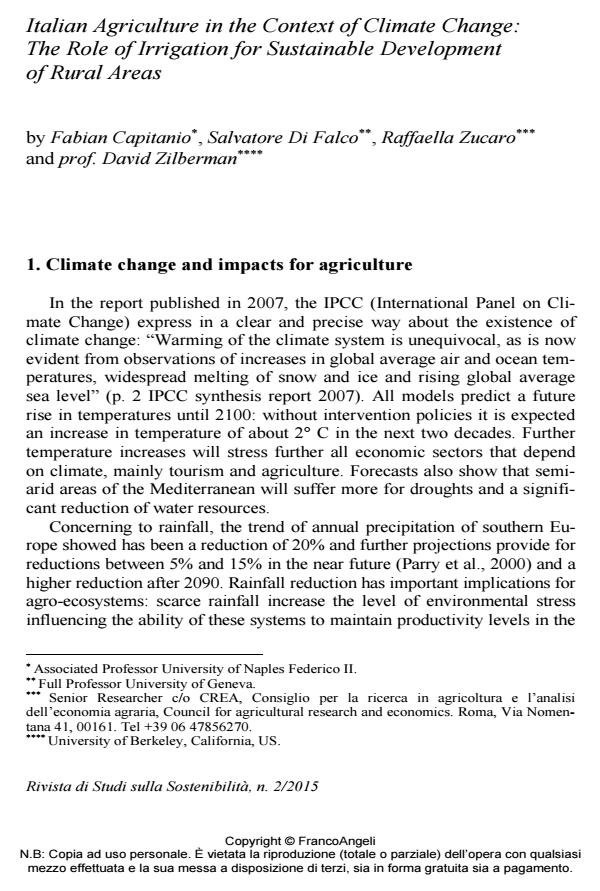Italian Agriculture in the Context of Climate Change: The Role of Irrigation for Sustainable Development of Rural Areas
Titolo Rivista RIVISTA DI STUDI SULLA SOSTENIBILITA'
Autori/Curatori Fabian Capitanio, Salvatore Di Falco, Raffaella Zucaro, David Zilberman
Anno di pubblicazione 2015 Fascicolo 2015/2
Lingua Inglese Numero pagine 22 P. 131-152 Dimensione file 284 KB
DOI 10.3280/RISS2015-002011
Il DOI è il codice a barre della proprietà intellettuale: per saperne di più
clicca qui
Qui sotto puoi vedere in anteprima la prima pagina di questo articolo.
Se questo articolo ti interessa, lo puoi acquistare (e scaricare in formato pdf) seguendo le facili indicazioni per acquistare il download credit. Acquista Download Credits per scaricare questo Articolo in formato PDF

FrancoAngeli è membro della Publishers International Linking Association, Inc (PILA)associazione indipendente e non profit per facilitare (attraverso i servizi tecnologici implementati da CrossRef.org) l’accesso degli studiosi ai contenuti digitali nelle pubblicazioni professionali e scientifiche
The work starts from the analysis of the objectives of the new Common Agricultural Policy which provides a tight integration between the agricultural and the climate-environmental components and that identifies a proper and efficient management of water for irrigation as an important instrument for the protection of this resource and, at the same time, for the development of primary sector. After the evaluation of the importance of irrigation investments for the competitiveness of Italian agriculture, the report contains an overview of the impacts of climate change in agriculture and of the economic models to estimate such impact; than it reports an econometric analysis to estimate the role of irrigation for Italian agriculture. Data used came from the database FADN. They refer to observations at farms level for the period 1990-2010. The main results of the econometric analysis are that irrigation of fruit and vegetable crops is particularly relevant to the northeast of the country (with an increase in income estimated in the order of 14%), and, the relevance of the irrigation of arable crops is related to the whole country (even if the most important impact has been observed for the south of Italy and the islands where we observed an increase in income of about 12%). In the second part the paper analyzes irrigation management in the different river basin districts. The analysis, made by OTE, shows a different degree of efficiency of irrigation in relation to the main characteristics of crops areas: in the Padano district and in the district of Alpi Orientali, with reference to cereals and fruit, irrigation management seems to be characterized by a lower level of efficiency; same situation is presented in the district of Sicily with refers to the cultivation of cereals. A higher degree of efficiency and virtuous behaviors emerge with reference to horticulture, floriculture and fruit in the districts Appenino Meridionale and Appennino e Settentrionale.
Il lavoro parte dall’analisi degli obiettivi della nuova Politica Agricola Comune che prevede una stretta integrazione tra la componente agricola e quella climaticoambientale e che individua nella corretta e più efficiente gestione della risorsa idrica a fini irrigui un importante strumento di tutela della risorsa e, allo stesso tempo, di sviluppo del settore primario. Dopo la valutazione dell’importanza degli investimenti irrigui per la competitività dell’agricoltura italiana, e la descrizione dei modelli per stimare tale impatto, viene presentata un’analisi econometrica per stimare il ruolo dell’irrigazione nell’agricoltura italiana. Le informazioni utilizzate sono quelle della banca dati RICA, riferite ad osservazioni a livello di aziende agricole ed al periodo 1990-2010. I risultati principali possono riassumersi nell’importanza dell’irrigazione per le colture ortofrutticole per le regioni del nord est (con un incremento di reddito stimato nell’ordine del 14%), e nella rilevanza dell’irrigazione per i seminativi per tutto il territorio nazionale (con un impatto più importante per l’Italia meridionale e nelle isole, con incremento di reddito pari a circa il 12%). La seconda parte del lavoro analizza la gestione dell’irrigazione nei differenti distretti idrografici italiani. L’analisi, distinta per OTE, ha evidenziato un diverso grado di efficienza nella pratica irrigua per le principali coltivazioni caratteristiche delle singole aree: nel distretto Padano e nel distretto delle Alpi Orientali con riferimento alla coltivazione di cereali e frutta, la gestione dell’irrigazione sarebbe caratterizzata da un più basso livello di efficienza. Parimenti, lo stesso accade nel distretto della Sicilia per la coltivazione dei cereali. Un maggiore grado di efficienza e comportamenti più virtuosi risultano, invece, per la coltivazione di ortaggi in pieno campo, orti industriali e floricoltura e frutticoltura nell’Appenino Meridionale e Settentrionale.
Parole chiave:Cambiamento climatico, risorse idriche per l’agricoltura, gestione risorse idriche, investimenti per irrigazione, programmazione sviluppo rurale, distretti bacino
Fabian Capitanio, Salvatore Di Falco, Raffaella Zucaro, David Zilberman, Italian Agriculture in the Context of Climate Change: The Role of Irrigation for Sustainable Development of Rural Areas in "RIVISTA DI STUDI SULLA SOSTENIBILITA'" 2/2015, pp 131-152, DOI: 10.3280/RISS2015-002011